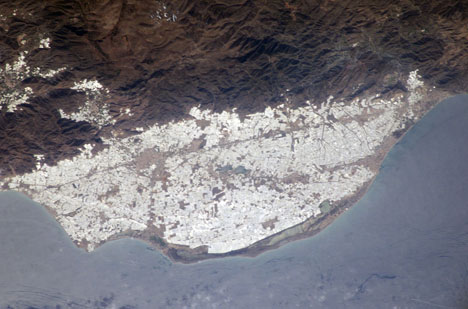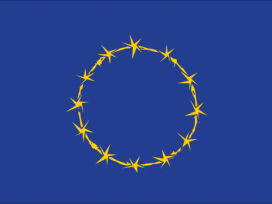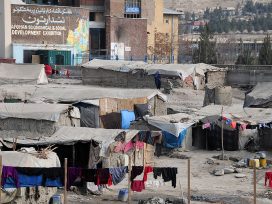The African boat migrants we see almost daily in the news are mostly young, healthy men who are looking for work. They come with peaceful intentions and with an apparently boundless belief in capitalism and democracy. Paul Collier, the British economist and author of the book Exodus (2013), says: “Migration from poor countries to rich ones is driven by the wide income gap between them”. We should have listened to Colliers’ voice much earlier: since the 1990s, he has drawn attention to the growing income gap between Africa and the rest of the world. No one knows the problems of African countries better than Collier. He has always emphasized that western trade policy towards Africa is a part of the problem. Collier already wrote in 2007, that our diplomats’ defence of subsidizing European agriculture with billions of euros and protectionist duties is “too shaming to accept”.

“At the end of the 1990s, the first boats left Morocco in the night for southern Spain with African migrants, the, who work in EU-subsidized fruit plantations in the Spanish region of Murcia: The Common Agricultural Insanity had reached a new level”, writes Franc below. Pictured above: the plastic sea of greenhouses in neighbouring Almería, as seen from outer space, stretching from the base of the mountains in the north all the way down to the shoreline. Photo: NASA. Source: Wikimedia
Western diplomats, on the other hand, maintain that their hands are tied owing to domestic policy. They point to the populace who would reject any proposal to open their agricultural markets. Indeed, the European population has so far been willing to spend countless billions in order to support its agriculture. As taxpayers, Europeans subsidize their agriculture, and as consumers, they accept high prices. Up until now, they have had no qualms about the fact that their diplomats mercilessly defend European agricultural policy in negotiations with the poorest countries of Africa. European cows cost more money to keep per day than millions of Africans need for survival. The masses of African economic migrants could bring about a change in attitude here.
From decolonization to the WTO
For decades, contributors to Schweizer Monat have preached that the state should hold itself back, withdraw and let private initiative prevail. Why shouldn’t this credo also apply to our relationship with Africa? Daily political campaigning only feeds the illusion that the thousands of Africans in search of work in Europe could be shipped away, out of public sight and out of mind, with a few more tax millions and some heavy-handed asylum policy manoeuvres. The tragedy, however, does not simply concern a few fishing ships in the Mediterranean, but the full length of the continent’s southern shores. This tragedy was programmed to happen decades ago.
Since the 1970s, Western trade policy has kept Africa out of international trade. Since the 1990s, boats carrying migrants have been landing. How did it come to this?
After the Great Depression of the 1930s and World War II, there followed a “golden age of globalization” in the 1950s and 1960s. True free trade with low trade barriers, and a high degree of freedom of movement for the means of production, capital and labour, facilitated the economic upswing of the post-war period in Europe, as well as in Africa, Asia and Latin America. In 1964, the newly independent and self-confident developing countries called upon the United Nations to convene a Conference on Trade and Development, UNCTAD. The developing countries were aiming to industrialize and demanded “trade not aid” from the West. Already in the 1960s, trade barriers, then still in the form of import taxes, blocked these countries’ access to the lucrative markets of the West. The West ostensibly accepted the suggested remedy of establishing tariff preferences for poor countries on their way to industrialization – but, at the same time, they surreptitiously resorted to non-tariff barriers which grew like a thicket of legal thorns surrounding “fortress Europe”.
In the 1970s, many developing countries made massive investments in infrastructure and relied on public-sector investment to develop their industry – for Africa this path ended in a debt fiasco. Asia, on the other hand, managed a successful transition and soon became competitors with Europe and the United States. The 1974 GATT Multi-Fibre Agreement (MFA) heralded the age of neo-protectionism in western countries: global free trade was dismantled as the result of an alliance of conservatives, nationalists and trade unions. Later on, it was envisaged that Third-World and environmental organizations, the “useful idiots” (Paul Collier’s quotation from Lenin), should use human rights and environmental protection as a moral cloak to disguise the West’s perpetual exclusion of Africa from world trade.
The creation of “fortress Europe” was also crucial in protecting its small economic area from external threats by introducing further trade barriers. It protected not only industry, but also, predominantly agriculture from competitors outside Europe. The establishment of the European Economic Community also necessitated the creation of a common agricultural market, which, with a simple stroke of the pen, seriously hampered any importation of agricultural products throughout Europe and freed the way for equally substantial agricultural subsidies and subsequent surplus production. Development economists were already calling the European Union’s Common Agricultural Policy (CAP) the Common Agricultural Insanity in the 1970s. From the perspective of trade policy, the European Union has put the former colonies in a worse position than they were in during the colonial period.
Then, in the 1980s, the IMF prescribed a neoliberal remedy for the over-indebted African countries: developing countries should stop experimenting with state-funded industrialization, and open their markets instead. As a result of this, many African countries ceased exporting raw materials and started importing them. Not only did Africa’s industrialization fail, but also the job markets associated with the raw material exports disappeared. The classic example of this – the tip of the iceberg – is sugar, which was being produced in the unified Europe of the post-war era using subsidized European sugar beet instead of tropical sugar cane. African academics trained in the 1960s went into exile in France, the United States, Germany and the United Kingdom: today this is called the first stage of Africa’s brain drain.
In 1986, at the Uruguay round of the GATT, the industrial countries refused to stop subsidizing their textile and, in particular, their agricultural industries. In the 1994 WTO Agricultural Agreement, agriculture was finally excluded from the agenda. At the end of the 1990s, the first boats left Morocco in the night for southern Spain with African migrants, the clandestinos, who work in EU-subsidized fruit plantations in the Spanish region of Murcia: The Common Agricultural Insanity had reached a new level.
The WTO negotiations stagnated in Seattle in 1999, in Doha in 2001 and in Cancún in 2003, because the North was still not prepared to make any concessions to the South over agriculture. The African countries of Benin, Burkina Faso, Chad and Mali turned to the WTO ahead of the 2003 Doha-negotiations and requested that the United States and the European Union stop their massive subsidization of cotton production. African cotton producers were losing a quarter of a billion US-dollars annually in cotton earnings alone, as a result of the West’s subsidies. Similar amounts can be assumed for agricultural products such as corn, cereals, nuts and fruit, and also for meat and fish. The request of the four African countries to put cotton on the agenda was up until now the only time that Africa was involved in the WTO. As already mentioned, until then, western diplomats and governments were not prepared to make any concessions for agriculture. Western diplomats used the African countries’ dependence on development aid, as well as on cheap wheat and rice imports, as a carrot and stick in the negotiations.
The entreaties of economists ignored
Numerous economists in academia have pointed out that we are actually facing not an asylum challenge, but an economic one. Paul Collier coined the phrase “the bottom billion”. At the beginning of this millennium, he warned: “If nothing is done about it, this group will gradually diverge from the rest of the world economy over the next couple of decades, forming a ghetto of misery and discontent.” Back in 1995 when the WTO was founded, Jagdish Bhagwati, the most renowned free-trade apologist, already accused the West for its continuation of neo-protectionism. Joseph Stiglitz, the Nobel Prize-winner and a colleague of Collier at the World Bank, demanded, after Cancún 2003, that “Fair Trade for All” should include the poorest countries as well. Esther Duflo und Abhijit Banerjee show in Poor Economics (2011) that multinational corporations fight poverty by – purely and simply – creating jobs. Dani Rodrik, another distinguished contemporary economist, on the other hand, tried to elucidate “the globalization paradox”: he accused his fraternity for having ignored and underestimated domestic political reservations against free trade.
In short, the economists accuse the conservatives for protecting agriculture, industry, armament exports and military intervention in the wrong places. They accuse the unions for their insistence on clinging to old employment structures. They accuse the NGOs for their fight against free trade and multinational firms. They all repeat the same mantra to no avail: we need jobs and economic growth – and this is not possible without genuine free trade. We are far from achieving this: as in the 1930s, the European Union and the United States are following a policy of beggar-thy-neighbour. They are protecting their own economy with subsidies and laws, preventing foreign direct investment of their firms abroad, and blocking foreign imports. The continent of Africa, Europe’s neighbour, has actually been turned into a “beggar”.
Still, there remains a glimmer of hope. Latin America and Asia have been able to defend themselves somewhat successfully, while Africa, excluded and dependent on aid, has to demand that the West, which has preached free trade for decades, permits it. The pictures of the economic migrants from Africa cannot be interpreted in any other way.
The picture is clear. Some of us are still familiar with the photographs of the 1930s Great Depression, which show large groups of young men looking for work. Back then, a world war was necessary to remind policy makers that free trade is crucial and herald in a genuine “golden age of globalization”. Politicians and diplomats today should employ the photographs of economic migrants from Africa to remind their populations and themselves of the economic necessity and the moral urgency of free trade in the twenty-first century.








